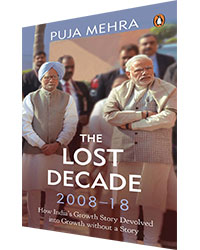 The Lost Decade (2008-18): How India’s Growth Story Devolved into Growth without a Story; Puja Mehra; Penguin random house; Rs.527 Pages 240
The Lost Decade (2008-18): How India’s Growth Story Devolved into Growth without a Story; Puja Mehra; Penguin random house; Rs.527 Pages 240
The Indian economy has been lurching from crisis to crisis for more than a decade. The latest crisis is still unfolding with the Covid-19 pandemic prompting a countrywide lockdown of factories and business establishments, and taking an economic toll on industry with a huge population dependent on the informal economy, unable to earn daily wages.
The current crisis is arguably not the government’s fault. A pandemic of this nature is not something anybody expected, and a fool-proof solution for India’s 1.3 billion population is a tough task at the best of times. These are far from the best of times. Government revenues are down, the private sector was hurting even in the run-up to the lockdown and is now nearly terminal, and people paid barely enough to get by, are getting fired.
At a time like this, it is essential that there’s perfect coordination between the government and various sector regulators. Indeed, we have already seen several signs of this coordination, with the ministry of finance, banking regulator RBI, stock market regulator SEBI, and insurance regulator IRDAI all coming together to present a comprehensive package to tide over this crisis. This type of coordination was not always the case. In fact, the lack of such coordination, coupled with episodes of individual mismanagement, allowed a strong growth momentum to slip away from India’s grasp over the last decade, as succinctly explained in Puja Mehra’s book.
The tale begins with the global financial crisis of 2007-08. The book highlights this crisis as a turning point for the Indian economy then poised for take-off. As Mehra points out, “The global financial crisis had the effect of freezing the Indian economy, from the monetary side, from the financial side and from exports side”. At this point, RBI and the government were at a stage when relations were good and so, even though the two did not always see eye to eye, things did not break down in the way they did later.
While 2008-09 was a year of resilience for the Indian economy, the following years were anything but. Mehra, a veteran financial journalist, uses all the skills of her craft to not only investigate what happened during the post-financial crisis period by interviewing many of the lead characters involved, she also presents the findings in a manner devoid of hyperbole, partisanship and unnecessary opinions. The Lost Decade is a journalistic work, through and through, allowing the book to be a comprehensive document of record, albeit somewhat dry in places.
That said, a dry and mostly dispassionate view is essential for anybody writing about the subsequent years of the Indian economy. Mehra’s work encompasses the entire gamut of politico-economic developments of the decade she has chosen to write about. It covers the years of double-digit inflation, infighting between the prime minister and finance minister, political games being played with appointments to RBI, a tectonic change in governments following General Election 2014, a complete breakdown in relations between the finance ministry and the central bank (RBI), the fallout of the disastrous demonetisation exercise, the chickens of profligate bank lending coming home to roost, and a leadership with no real expertise to guide it.
It takes a good reporter to cut through what was happening at the time — most of which was behind the scenes and hidden from the public — and to weave an engaging and nonpartisan tale out of it. This, Mehra has accomplished.
She has also managed to pepper the book with several observations and questions that a reasonably inquisitive mind would be interested in. Who was the mysterious person sending packages of documents to media organisations as the 2G spectrum scandal unfolded? Was former RBI Governor Urjit Patel a bystander when demonetisation happened or was he a participant? Over the course of its decade-spanning narrative, the book raises these and other questions, and answers several.
While the current economic crisis is very different from the ones India has had to face over the past decade and more, there are still numerous lessons the leadership can learn from how things unfolded in the last ten years. In fact, officialdom in North Block and Lok Kalyan Marg would do well to go through this book, as would anybody else interested to see how India, poised to become a world power in 2008, seems to have transformed into an also-ran.
T.C.A. Sharad Raghavan (The Book Review, June)
Also read: Mandatory reading























